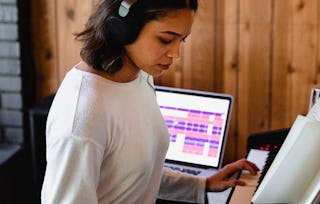If you have always dreamed of playing the piano or keyboard but did not know where to start, this is the course for you. This course will take you through the fundamental skills necessary to build your playing capability quickly and healthily. In addition to the fundamentals, you will learn from exercises and examples from popular music so that you can start playing in multiple styles. You will start by focusing on posture, breathing, movement, and sound production that will help you strengthen your finger independence and control over dynamics, phrasing, articulation, tempo, and pulse.

Piano Techniques for Modern Music
Ends soon: Gain next-level skills with Coursera Plus for $199 (regularly $399). Save now.

Piano Techniques for Modern Music

Instructor: Zahili Gonzalez Zamora
16,142 already enrolled
Included with
(23 reviews)
Recommended experience
What you'll learn
Develop proper technique to play the piano
Maintain healthy playing habits
Apply proper piano technique while playing modern/contemporary music
Skills you'll gain
Details to know

Add to your LinkedIn profile
See how employees at top companies are mastering in-demand skills

There are 4 modules in this course
Welcome to Piano Techniques for Modern Music! Before you begin the course, we will cover all the details that you'll need to know to get the most out of your experience. Then, we will begin with the fundamentals of healthy piano playing, starting with proper posture and breathing, finger placement and hand position, before moving on to the C major scale and popular cadences. We will begin to build a healthy practice routine and have some fun with improvisation.
What's included
7 videos6 readings2 assignments1 peer review2 discussion prompts
In module 2, we will start to add greater finger independence to our practice and learn to shift our hands across the keyboard in order to play a wider range of notes with minimal tension in our hands and arms. We will also look at expanding our dynamic range on the piano and applying these techniques to several contemporary music examples.
What's included
6 videos2 readings2 assignments1 peer review
In module 3, we will begin to advance our harmonic techniques by expanding our chord knowledge and increasing our playing speed. We will also identify proper wrist technique to minimize tension while playing. We will continue to play through popular tunes and focus on building hand independence.
What's included
6 videos1 reading2 assignments1 peer review1 discussion prompt
In module 4, we will combine all of the hand techniques we have been developing with pedaling. This will require coordinating our hands and feet. We will practice these techniques using classical music and contemporary tunes. We will also identify what pedaling techniques are common in contemporary music and how to develop virtuosity on the piano. We'll finish by discussing how to organize practice time to learn difficult pieces and why using a practice journal and recording practice session can lead to bigger improvements at a faster rate.
What's included
7 videos4 readings2 assignments1 peer review1 discussion prompt
Instructor

Offered by
Explore more from Music and Art
 Status: Preview
Status: Preview Status: Free Trial
Status: Free TrialBerklee
 Status: Free Trial
Status: Free Trial Status: Free Trial
Status: Free TrialUniversity of Colorado Boulder
Why people choose Coursera for their career




Learner reviews
23 reviews
- 5 stars
100%
- 4 stars
0%
- 3 stars
0%
- 2 stars
0%
- 1 star
0%
Showing 3 of 23
Reviewed on Jun 30, 2024
Thank you so much to teach on this course. I have learnt a lot. Thanks again.
Reviewed on Apr 14, 2025
Great techniques for getting back into playing the piano
Reviewed on Jul 7, 2023
Great course I'm only done with week one and I have already learned so much.
Frequently asked questions
To access the course materials, assignments and to earn a Certificate, you will need to purchase the Certificate experience when you enroll in a course. You can try a Free Trial instead, or apply for Financial Aid. The course may offer 'Full Course, No Certificate' instead. This option lets you see all course materials, submit required assessments, and get a final grade. This also means that you will not be able to purchase a Certificate experience.
When you purchase a Certificate you get access to all course materials, including graded assignments. Upon completing the course, your electronic Certificate will be added to your Accomplishments page - from there, you can print your Certificate or add it to your LinkedIn profile.
Yes. In select learning programs, you can apply for financial aid or a scholarship if you can’t afford the enrollment fee. If fin aid or scholarship is available for your learning program selection, you’ll find a link to apply on the description page.
More questions
Financial aid available,
¹ Some assignments in this course are AI-graded. For these assignments, your data will be used in accordance with Coursera's Privacy Notice.





